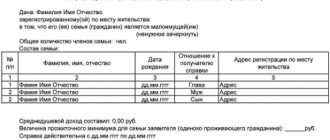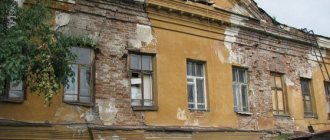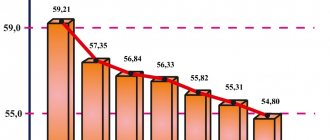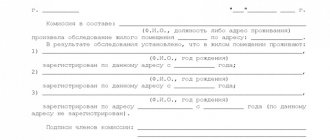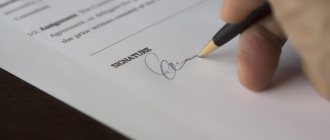The state program “Affordable Housing for Young Families” started almost recently and is aimed at making housing conditions easier for young people. The program is federal and on its basis the regions have developed their own programs.
Despite the well-known aphorism: “nothing separates people like shared housing,” young families try to live separately from their parents, in a comfortable apartment. Many families dream of living in their own home, so as not to become heroes of the joke: “after turning off the TV, you are convinced that you were listening to your neighbor’s TV.”
The dream of owning your own home can become a reality thanks to the federal program for improving housing conditions. This program was approved by Government Decree No. 1050 dated December 17, 2010. The federal program itself includes several subprograms. One of them involves mortgage lending at a preferential rate, the other provides free subsidies to young families.
Let us indicate the most popular of them.
- Federal project "Mortgage". The goal of the program is to provide affordable housing to families with average incomes, including creating opportunities for them to purchase (construct) housing using a mortgage loan, the rate of which should be less than 8 percent. The program runs until 2024.
- Federal project “Financial support for families at the birth of children.” The goal of the program is to provide mortgages and loans to families with two or more children at an annual rate of 6 percent. The program runs until 2024.
For example, starting in 2021, a new program is being implemented for young families living in the Far East - a preferential mortgage loan at a rate of 6%. In addition, a family can receive 1 hectare of land for each member.
Determining the need to improve living conditions
According to the provisions and norms of the relevant code of the Russian Federation that have entered into legal force, one of the key factors that allows you to get in line is the size of the living space actually belonging to one person.
By law, this size must be fifteen or more square meters. These figures may vary depending on the region. If each family member is provided with the required number of square meters, it will not be possible to stand in line for a change in living conditions. For example, if four people live in a 60-meter apartment, two of whom are father and mother, and the other two are children, then before the changes to the Housing Code came into force, a child who had reached the age of majority could stand in line for a change in living conditions on the basis lack of personal ownership rights to a specific apartment. Today, given the fact that each family member has 15 square meters, an adult son or daughter of a tenant will not be able to qualify for housing.
The procedure for placing on the waiting list in the event of divorce between spouses is regulated in a similar way. If spouses have a common apartment with an area of 30 square meters or more, then it will not be possible to improve living conditions at the expense of the state. If mother and son live together in the same room, this rule does not apply. An adult son living with his mother in a one-room apartment of any size can join the queue.
Please note that today we are summing up the total number of square meters that belong under ownership rights to a specific family within the same city or locality, including apartments and houses owned by relatives - a spouse, parents of a spouse, joint children , other related persons living in the same territory and leading a joint household. For example, none of the members of a family consisting of three people living in an apartment of two rooms with an area of 40 square meters has the right to improved living conditions if in the same locality one of them has a residential house, apartment or room, and with taking into account its area, each person accounts for more than fifteen square meters.
Family in the broad sense of the word
It is worth understanding what meaning housing legislation gives to the concept of “family member” and who it includes.
Family members include persons who live with the owner of the residential premises:
- spouse,
- parents,
- children,
- other relatives
- sometimes disabled citizens who are moved into the apartment by the owner himself as a family member can be recognized as such.
The key role is played by the confirmed fact of cohabitation of these persons with the owner of the premises.
Procedure for registering adult children
According to the conditions used earlier, a child who had reached the age of majority could receive a separate apartment if the family was registered. Thus, the queue was divided not after reaching adulthood, but at the time the child’s parents or guardians entered the queue. Today the situation has changed, and the division of priority is carried out after reaching the age of majority or entering into legal marriage. Queue accounting begins from this moment. This amendment is relevant if the young person submitting the application does not have ownership rights to any housing.
If children born after divorce or adopted do not have their own housing at the time of filing their application, they also have the right to decent living conditions. This rule applies if children do not have square meters in the apartment or house of their parents or guardians when submitting documents independently.
Before the amendments came into force, the fact of reaching adult legal age was the basis for placing on the waiting list for the provision of housing property for each person living in a communal apartment or social apartment. Today, additional documents are required confirming that the applicant has less than fifteen square meters.
According to modern standards, citizens who have the right to receive social housing can also apply for the allocation of space in the amount of 15-20 square meters per person, with the exception of those square meters that are owned by the applicant at the time of submission of documents.
For example, if a father, mother and child apply for a social apartment, then the housing criteria for them is 45-60 square meters of area. If any of them owns a room or house with an area of 20 square meters or more, this family can receive social housing with an area of up to 25-40 square meters.
Where can the subsidy be spent?
Let us immediately note that the subsidy is not transferred to the young family’s card and is not issued in cash. The purchase of housing is carried out through banks.
The program provides for the use of subsidies for:
- purchasing an apartment in a new building;
- purchase of a “resale” - a finished apartment;
- investment in house construction;
- making the last payment towards the share contribution, if the young family or one of the spouses in the young family is a member of a housing, housing construction, housing savings cooperative;
- payment as a required payment on a mortgage loan.
How to get on the waiting list for housing?
If there are legal rights to be included in the queue to improve housing conditions, a citizen of the Russian Federation must perform a number of mandatory actions. First of all, you need to collect the necessary documents and submit them to administrative officials at the place of registration of housing. Simultaneously with the documents, an application is submitted asking for improvement of living conditions. The documents and application are reviewed by authorized persons, and the applicant receives a written response. This response confirms the fact that the applicant has been registered and included in the list of those applying for improvements in housing conditions. In case of refusal, the letter must contain reasoned arguments and grounds for refusal.
In order to avoid possible refusal and achieve a positive result when applying, it is necessary to cooperate with a qualified lawyer. Each lawyer of the Moscow Municipal Bar Association is an expert in the legal field in question and offers a full range of services to clients. This:
- Initial consultation and objective assessment of the grounds for requesting improvements in housing conditions at the time of filing the application.
- Assistance in collecting documents that are necessary for registration and joining the queue based on various government programs.
- Appealing decisions made by the commission in case of refusal to be included in the list of candidates.
- Support at the stage of receiving subsidies, issuing an owner’s certificate and other documents.
- Submitting official requests and conducting the necessary examinations to confirm the right to resettlement.
- Other types of legal assistance.
Contacting a lawyer in a timely manner will help you save time and get the best possible result. MMCA lawyers are competent to assess and implement various legal grounds that have a direct impact on ensuring decent living conditions. Sign up for a consultation with a lawyer now and get answers to any questions you may have.
Bad conditions concept
Important! Poor living conditions are represented by conditions that do not meet various sanitary or hygienic standards.
Additionally, these include living in real estate whose quality is below the minimum level. Also, often many people live on one property, so the minimum amount of space is not allocated for 1 person.
According to statistics, only 20% of the Russian population lives in optimal conditions, taking into account the square footage standards for all family members, for which it is taken into account that at least 18 square meters should be allocated per person. m.
Approximately 25% of the population can use government help to improve their conditions, but many people prefer to deal with their problems on their own.
Services for citizens and organizations
| Oral (face-to-face) legal consultation with the duty lawyer with the study of documents submitted by the client | from 2,400 rub. |
| Oral (face-to-face) legal consultation with an industry specialist lawyer with the study of documents submitted by the client | from 4,800 rub. |
| Study by a specialist lawyer of the case materials presented by the client, judicial practice in the case, development of the legal position of the defense (using professional legal resources), outside the framework of an oral consultation | from 1,200 rub. |
| Departure of the duty lawyer to the principal | from 3,000 rub. |
| Preparation of the primary written legal document (application, complaint, petition, legal opinion) | from 7,000 rub. |
| Oral (face-to-face) legal consultation from an industry specialist lawyer without studying documents | from 2,400 rub. |
| Oral (face-to-face) legal consultation of the duty lawyer without studying documents | from 1,200 rub. |
| Hourly wages for a specialist lawyer for comprehensive protection of the client’s rights | from 2,500 rub. |
| Lawyer's request to government institutions and organizations | 4,800 rub. |
How conditions are improving
- To improve these conditions, you need to register.
- Next, documentation is prepared and submitted to the administration of a specific subject of the Russian Federation.
- Then you just have to wait for a decision to be made.
- If it is positive, then the family gets on the waiting list or receives a subsidy.
How to register
According to Article 52 of the Housing Code, registration of people is carried out only if the appropriate conditions exist.
This requires supporting documents, which can be represented by the following documents:
- income certificate indicating that citizens are low-income, and this includes families in which 4 people have less than $300;
- a certificate from the house register, which indicates the number of citizens registered in the housing, as well as the square footage of the apartment, so you can calculate how many square meters there are per 1 resident;
- a certificate from the Unified State Register of Real Estate confirming that the person does not have his own home;
- a decision of the housing commission, which indicates that a particular property is indeed in disrepair;
- a medical certificate, based on which it is clear that a person with a chronic and contagious disease lives in the same property with the applicant and members of his family, therefore constant presence near him is dangerous for citizens.
Important! It is imperative that all family members receive income certificates from their place of work so that they can determine how much money the family receives per month.
When determining the level of income, not only cash receipts are taken into account, but also existing property is assessed.
Sample act of inspection of housing conditions.
The documentation is reviewed for one month, after which applicants receive a written response. Based on Art. 54 of the LC, it is possible to challenge a negative decision, for which you need to go to court.
Article 54. Refusal to register citizens as those in need of residential premises
1. Refusal to register citizens as those in need of residential premises is permitted if:
1) the documents provided for in Part 4 of Article 52 of this Code, the obligation to submit which is assigned to the applicant, have not been submitted;
1.1) the response of a state authority, local government body or an organization subordinate to a state authority or local government body to an interdepartmental request indicates the absence of the document and (or) information necessary for registering citizens as those in need of residential premises in accordance with Part 4 Article 52 of this Code, if the relevant document was not submitted by the applicant on his own initiative, except for cases where the absence of such requested document or information at the disposal of such bodies or organizations confirms the right of the relevant citizens to be registered as those in need of residential premises;
(clause 1.1 introduced by Federal Law dated December 3, 2011 N 383-FZ)
2) documents have been submitted that do not confirm the right of the relevant citizens to be registered as those in need of residential premises;
3) the period provided for in Article 53 of this Code has not expired.
2. The decision to refuse registration must contain the grounds for such refusal with a mandatory reference to the violations provided for in Part 1 of this article.
3. The decision to refuse registration is issued or sent to the citizen who submitted the corresponding application for registration no later than three working days from the date of such decision and can be appealed by him in court.
Typically, the refusal is due to the fact that living conditions were deliberately worsened by people, and also that citizens have fairly high incomes. If the refusal is unfounded, it can be challenged in court.
What documents are needed
Registration, which makes it possible to improve the conditions in which people live, is carried out on the basis of certain documentation.
It includes:
- passports or birth certificates of all family members;
- the applicant's marriage certificate;
- an extract indicating the composition of the family;
- title papers for real estate if it belongs to the family;
- registration certificate for real estate;
- certificate of availability of valuable property, represented by dachas, garages or cars;
- certificate from the BTI for housing;
- information about the cadastral price of the property;
- income certificates.
Important! The full number of documents can be obtained from the administration staff.
